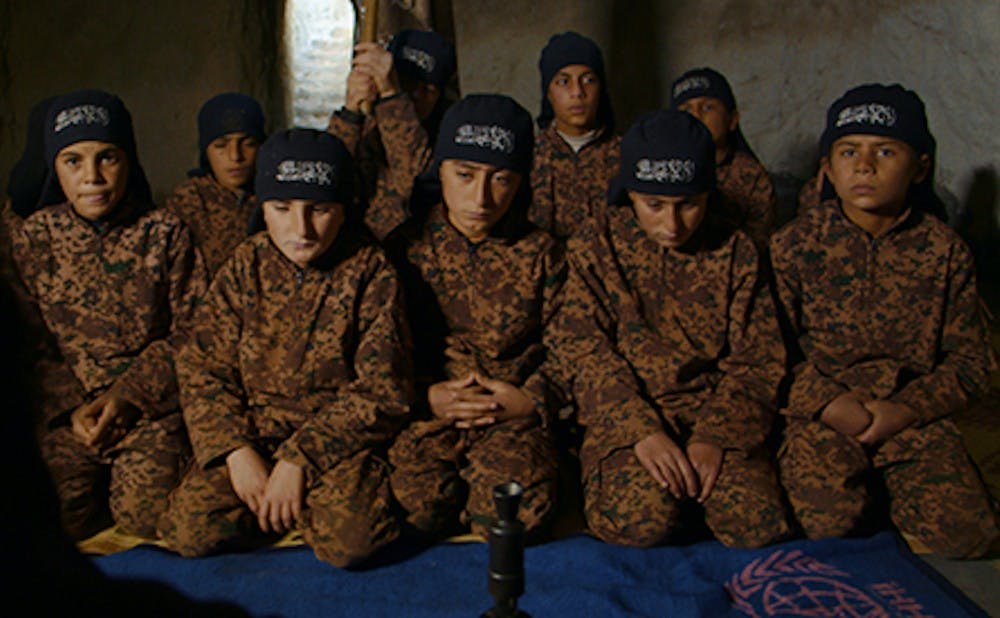Imagine a 12-year-old child growing up in Syria. The place that he calls home is a country ravaged by civil war. He plays with his brothers among hidden land mines. His father is a soldier, part of the Islamic extremist and jihadist organization al-Nusra Front. His name is Osama — named after the man responsible for the September 11 attacks.
“Of Fathers and Sons” is director Talal Derki’s second feature length documentary set in his home of Syria. The film won World Cinema Grand Jury Prize in Documentary at this year’s Sundance Film Festival. Derki gained access to this extremist family by posing as a jihad-supporting photojournalist trying to document their cause.
I didn’t know what to expect of this film, included in this year’s Full Frame Documentary Festival in Durham. Sitting in Cinema One at the Carolina Theatre, I experienced just about every emotional extreme.
For most Americans, trying to understand how Islamic extremists think is like trying to hear a conversation through a concrete wall. “Of Fathers and Sons” breaks that wall. We hear loud and clear as the phrase “Allah is great” is repeated methodically after the father, Abu Osama, shoots down an enemy fighter from his sniper’s nest.
Although the film follows the father, it also tells the story of his sons who are devoted to him. The oldest, Osama, adores his father and wants to follow in his footsteps. As part of the indoctrination that happens within the organization, Osama and boys his age are sent to military camp. The training is rigid, harsh and terrifying. The boys sleep on concrete floors huddled together for warmth and companionship. Training involves everything from jumping through literal hoops of fire to lying flattened on the ground as trainers fire bullets next to their faces or at their feet. They are expected to forget fear and remain unflinching.
These boys have not yet reached puberty. They have no understanding of a world outside of Syria, one untouched by violence and war. They have no concept of a God that is uncolored by extremist ideology. They have no experience of a childhood devoid of games where they take turns jumping on homemade bombs to see whom they would explode on.
Throughout the film, I was overwhelmed by feelings of shock, fear, disgust and anger. I saw an intimate portrait of how these jihadists think and behave, but I was all the more confused by how they were able to justify their way of life. In many scenes, Osama and his father show their love for each other, proving that they are capable of caring deeply about each other. When Abu Osama loses his leg to a mine, the son sheds genuine tears of distress as the elder comforts him and assures him that it was part of God’s plan. Then I remembered that this was the same man who was ecstatic about the fact that one of his sons was born on September 11, a day marking the deaths of almost 3,000 people.
This narrow definition of love is perhaps the most dangerous tactic used to indoctrinate children into al-Nusra. Love is reserved for male family members and those who advance the mission of jihad. Everyone else is not deserving and their murder can be justified under the name of God. These children grow up amid burning debris. Surrounded by a sense of hopelessness, perhaps the only solution is a blind faith in jihad and mindless devotion to martyrdom.
The tension between love and hate is felt most clearly when Abu Osama talks with another male member of the militia about his two-year-old niece. The male mentions that she is not wearing a hijab and Osama says that if a boy ever saw a girl without a hijab, he should “go shoot her.” The glaring absence of females in the entirety of the film suggests the invisible workings of a powerful patriarchy.
Derki allows us to decide for ourselves by being unapologetically intimate, at times explicit and emotionally honest. He takes us into the home and heart of the main character Abu Osama. As he beats his son for starting a fight, we remember when he also told the same son not to hurt a bird he had captured. We remember the moment when he killed a man without a second thought and when he held his baby son up to his face and grinned brightly. The presence of both love and hate, tenderness and violence, creates a dizzying paradox.
The film ends with a shot of the director. He trudges along an unremarkable dirt road. The desolate land of Syria is sprawled out around him. Derki says that he will return to Germany, away from the nightmare of the last two years and away from a homeland he no longer recognizes. I left the darkness of the theater with an unshakeable sense of loss and weariness and an intense urge to escape.
Get The Chronicle straight to your inbox
Sign up for our weekly newsletter. Cancel at any time.

